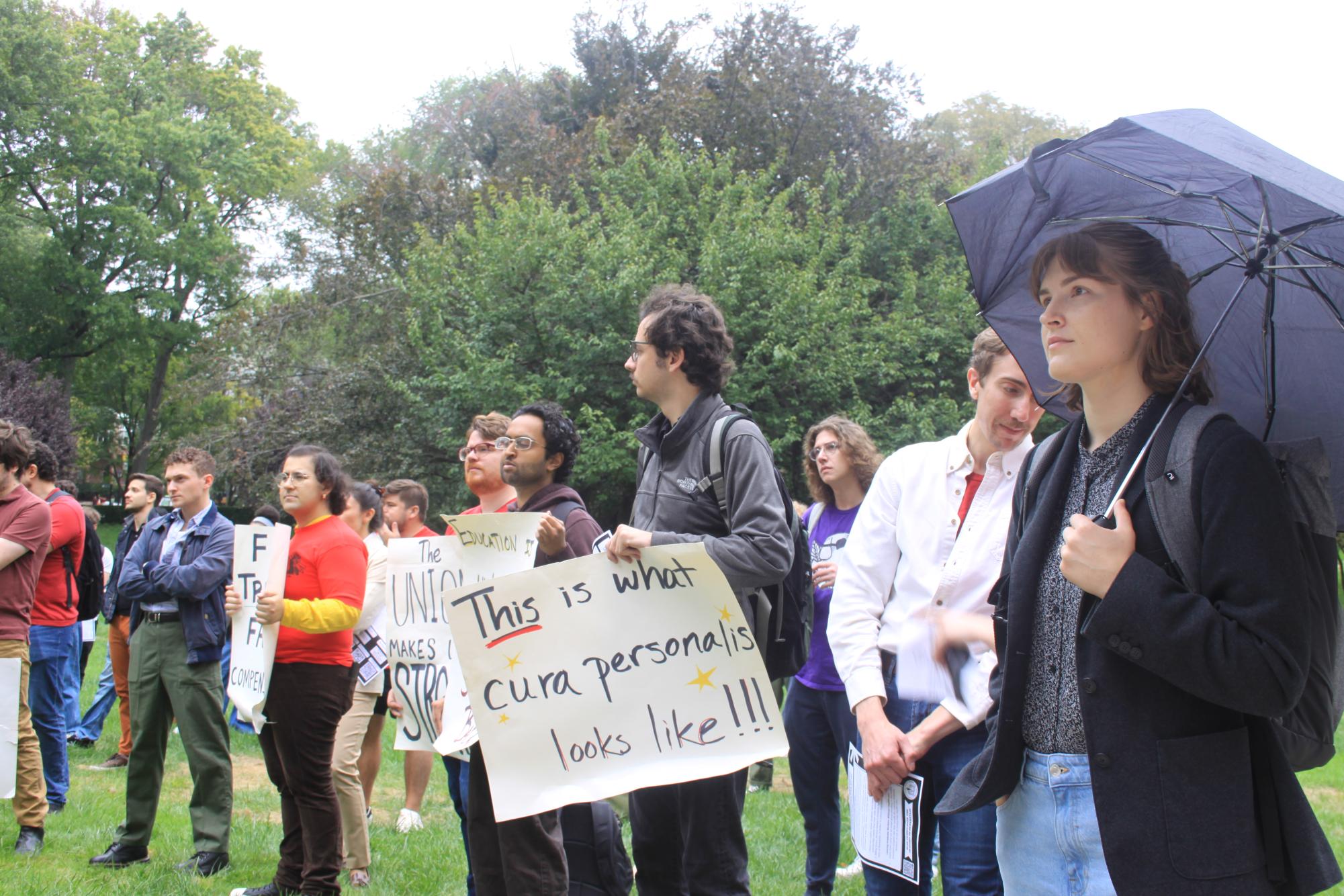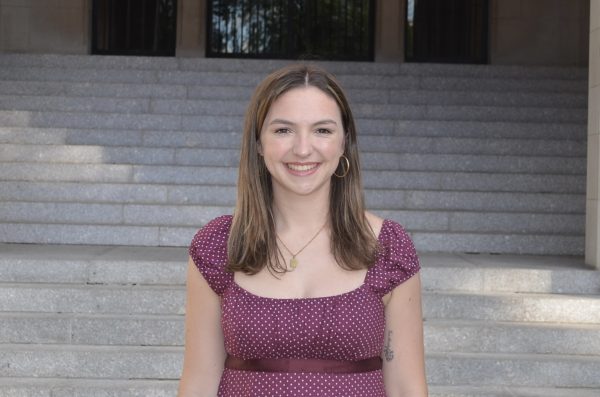Graduate student workers (GSW) rallied outside of the William D. Walsh Family Library on Sept. 17 to protest grievances against Fordham University’s Graduate School of Arts and Sciences (GSAS). The grievance topics included issues with GSW health insurance, payment cycles and Graduate Student Council (GSC) officers’ compensation.
“We’re out here today because despite that excellent contract that some people in this very crowd worked extremely hard to get and fought really hard for, the administration of Fordham University has been seemingly waging a systematic campaign to disregard that contract, to disrespect it and ultimately to disrespect us as workers and as students here at Fordham University,” said Molly Crawford, a Ph.D. candidate in the GSAS theology department and one of the Fordham Graduate Student Workers Union (FGSW) chief stewards.
In the spring of 2024, FGSW and Fordham reached a contract agreement after almost two years of bargaining sessions. But now, a year into that contract, FGSW is again alleging unfair treatment of GSWs by the university.
GSWs are compensated with a stipend — a fixed sum of money — that is paid in two-week pay cycles throughout the course of the academic year, according to Dakota Hampton, a fourth-year Ph.D. student in the theology department. However, on Aug. 8, when students received their first paychecks, they only received a week’s worth of compensation. Hampton said that in past years, regardless of the first pay date, they have always received two weeks’ worth of compensation in each pay cycle. He also said that the university did not inform GSWs that this year’s payment would be different.
At the rally, Alex Gruber, a third-year Ph.D. student in the theology department, read a testimony by an FGSW union member about the personal effects of the altered pay cycle.
“Receiving only half of my expected paycheck in early August was more than a minor inconvenience. It was a destabilizing event,” Gruber said, reading the testimony. “By the time August arrives, that first paycheck is not a cushion, but a lifeline. It is what allows us to pay rent, buy groceries and begin to recover from the strain of three months without income. To receive only half of what was expected created a level of stress and financial insecurity I had no ability to plan for.”
Speakers at the event also talked about recent issues regarding GSW health insurance. Students are typically notified by the administration shortly before their university-provided health insurance expires so that they can go through the proper steps to re-enroll in the program, according to Hampton. However, students did not receive an email this year until almost two weeks after their coverage ended on Aug. 22. In an email read by sixth-year Ph.D. candidate Matthew Siebert at the rally, Nick McIntosh, also a sixth-year Ph.D. candidate, said he did not discover that he was without insurance until he went to the pharmacy to pick up a prescription.
“This is not a minor oversight. It is a grave error, exposing graduate students to serious financial and medical risks. I’m disturbed when I consider how long I might have been uninsured before someone took notice and informed me,” Siebert said, reading an email that McIntosh sent to the university on Aug. 28.
Crawford also talked about ongoing issues regarding GSC officers’ compensation and the effect they have had on the current GSC president, Anya Wang. Last spring, GSAS determined that the work of the GSC president and vice president should be compensated as service rather than work. The administration and FGSW are in ongoing discussions regarding this compensation.

The university has addressed several of these claims in a fact sheet given to The Fordham Ram by Justin Bell, vice president of marketing and communications.
In response to the claim that “instructors are receiving half their paychecks,” the fact sheet stated that because the GSW fall assignments started on Aug. 2, midway through the two-week payroll period, they were only to be paid for one week’s worth of work on their first pay date of Aug. 8.
The fact sheet also responded to the issue of GSC officers’ compensation. The statement clarified that GSAS does intend to pay GSC officers, but that the compensation should reflect the roles’ definition as service rather than work.
In response to the claims regarding GSW health insurance, university spokesperson Jennifer Petra said that the university is not aware of any situations in which students have lost their health insurance coverage. Petra also said, “GSAS (and the University) continue to adhere to the terms of the collective bargaining agreement (labor contract) signed in May 2024 and have worked with the union to resolve any differences that may arise.”
Aside from the rally, FGSW is also making its voice heard through a petition aimed at Ann Gaylin, vice dean of GSAS. The petition includes a letter that details recent actions by the administration and their impact on GSWs. The letter asserts that the administration has failed to care for GSWs as whole people, a value central to Fordham’s mission of cura personalis. Rally speakers echoed this, saying recent actions conflict with the university’s Jesuit identity.
“The teachings of the Catholic Church on social justice, on workers’ rights, the right to have a union, of living wage to be able to support a family, those all matter a lot to me,” Gruber said. “And to be at a university where I see those values being preached by administrative officials, but not carried out on the ground for graduate students, deeply disappoints and frustrates me.”









































































































































































































